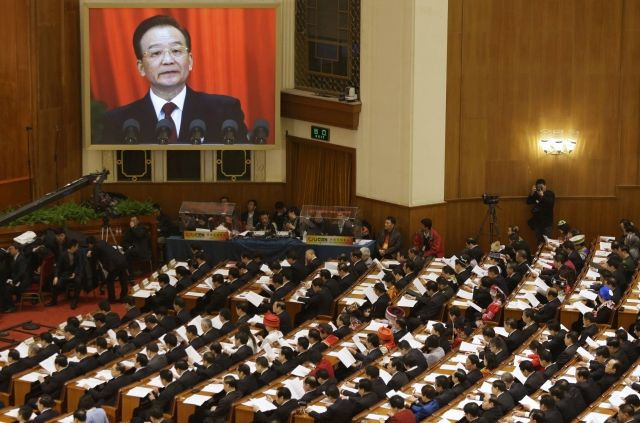Wen Hikes Defense, Home Security Budgets; Promises Stable Growth In Government Work Report

China’s outgoing premier, Wen Jiabao, delivered his final government work report on Tuesday morning. The report hiked defense spending by 10.7 percent to 720.2 billion yuan ($115.7 billion) and set the country's economic growth target for 2013 at 7.5 percent.
Wen promised stable growth for the nation and to cap the Consumer Price Index (CPI) at around 3.5 percent, the state-run Xinhua news agency reported.
Wen presented the report at the cavernous Great Hall of the People in Beijing as a new leadership line is set to assume power in the coming days.
Four months after taking over as General Secretary of the Communist Party, Xi Jinping will replace outgoing president Hu Jintao. Li Keqiang will become premier, replacing Wen Jiabao.
Wen opened the 12th National People's Congress (NPC) on Tuesday by promising anti-corruption measures and better welfare provisions. He also called for balanced development growth in his speech, which focused on past achievements and future plans.
The premier also vowed to create more than 9 million urban jobs and to keep the registered urban unemployment rate at or below 4.6 percent.
Defense spending constituted about 5.4 percent of the total budget, up from 5.3 percent last year, and it remains at about one-fifth of the Pentagon's base budget of $534 billion. However, the increase is less than half the 11.2 percent increase recorded in 2012.
In the wake of a series of territorial disputes between Beijing and several neighboring nations, including U.S. allies Japan, South Korea and the Philippines, China's military budget increases are keenly watched in Asia as well as in the U.S.
In his speech, Wen promised to “resolutely uphold China's sovereignty, security and territorial integrity,” that was greeted by a round of applause by delegates, according to a BBC report.
This is for a third year in a row that the communist nation’s military expenditure will be exceeded by domestic security budget, which will go up by 8.7 percent to 769.1 billion yuan ($123.5 billion), underscoring Beijing’s concern about internal threats in the wake of unrest over corruption and pollution.
The number of "mass incidents" of unrest recorded by the Chinese government grew from 8,700 in 1993 to about 90,000 in 2010, according to several government-backed studies, Reuters news agency reported.
Wen addressed the issue to corruption saying the government should “ensure that the powers of policy making, implementation and oversight both constrain each other and function in concert.”
He warned that China has been facing difficulties including uncoordinated and unsustainable development as well as increasing conflict between economic growth and environment.
“The state of the ecological environment affects the level of the people's well-being and also posterity and the future of our nation,” he said.
Boosting domestic consumption is a "long-term strategy for economic development,” Wen said, adding: "To expand individual consumption, we should enhance peoples' ability to consume, keep their consumption expectations stable, boost their desire to consume, improve the consumption environment and make economic growth more consumption-driven."
"China remains in an important period of strategic opportunities during which much can be accomplished," Wen said.
He spoke of improving pension provision for the poor, adding: “The development gap between urban and rural areas and between regions is large, and so are income disparities between individuals.”
Wen's report said China will continue to implement a proactive fiscal policy, with the government priority placed on education, medical and health care, and social security. The country’s prudent monetary policy will continue with a 13 percent growth target of the broad money supply.
Around 3,000 delegates are attending the NPC, majority of them belonging to the Communist Party, but also include members of the military, monks, ethnic minority representatives and business tycoons.
The delegates are expected to ratify the decisions already made by senior party leadership, rather than debate policy issues.
© Copyright IBTimes 2025. All rights reserved.






















